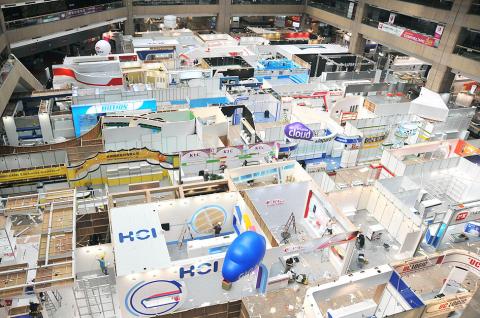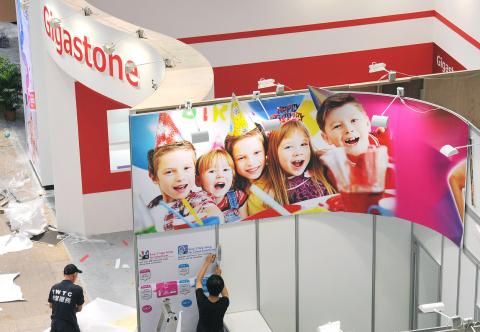Asia’s largest tech trade show will be a battleground for smart innovations when it begins in Taiwan tomorrow — pitting new inventions, such as car systems which warn the user if they are driving badly to a toothbrush-style camera that films the user’s teeth, against each other.
More than 1,500 exhibitors, including some of the world’s leading technology brands, will set out their stalls at Computex in the Taipei World Trade Center, with 130,000 visitors expected to attend the five-day event in the Taiwanese capital.
This year’s edition is to feature a new SmarTech area featuring smart wearables, 3D printing, intelligent vehicle systems and security — a move which organizers say reflects the increasing role of smart technology in all parts of everyday life.

Photo: Mandy Cheng, AFP
“We’re looking to interest everybody, from ordinary people to government officials,” said Chang Li (張笠), deputy secretary-general of the Taipei Computer Association, a co-organizer of the show.
Watches, rings and wristbands that connect to Internet cloud services that collect and analyze data is a dominant trend for the new generation of wearables being showcased, Chang said.
“Smart wearables are not a new technology, but combining them with cloud computing means the wearer’s data is collected all day every day, is analyzed and can predict your body’s condition, giving warnings of potential health problems,” he said.

Photo: Mandy Cheng, AFP
The nation’s leading personal computer maker, Acer Inc (宏碁), announced on Friday the launch of its first wearable device, the Liquid Leap smartband, which will make its debut at Computex.
The one-inch touchscreen smartband has fitness tracking, phone and SMS notification and music control, and will be sold together with the Liquid Jade smartphone. The devices will also link to Acer’s new cloud services as the struggling company tries to transition away from PCs to revive its fortunes.
“I think the introduction of the SmarTech area shows how dynamic Taiwanese companies are,” Singapore-based tech blogger Alfred Siew said. “Computex has traditionally been a very PC-focused show because there are a lot of PC and component manufacturers there.”
“But since last year there has been a prominent shift towards mobile devices — tablets and phones. Taiwan is a very dynamic economy when it comes to adapting to change,” he said.
The show will also have a zone dedicated to convertible tablets as they try to elbow laptops out of the market, a “touch display” area and one for mobile cloud computing.
Microsoft, Intel and Asus (華碩) are among the major players attending Computex, but it is also a platform for lesser-known brands and start-ups.
Taiwanese company Abeltech (亞柏工業) won a pre-show Best Choice award for its Cloud Intraoral camera, which is shaped like a toothbrush and videos the inside of the user’s mouth, linking the high-definition footage to smartphones and tablets.
In the intelligent vehicle offerings will include a car system which gives a warning to drivers if they swerve out of lane, organizers said.
“There are a lot of small innovative start-ups in Asia, which will want to use Computex as a place to show their technology,” said Nicole Peng (彭路平), Shanghai-based analyst for market research firm Canalys.
However, while the latest smart devices may deliver the biggest wow factor, the less glamorous aspects of computer technology, from motherboards to components, will also play their part at Computex — and are essential to the region’s success in the tech world, Peng said.
“The region is not as outspoken or as loud as Silicon Valley, but I think a lot of mainly smaller-scale innovations happen here, on the components side and materials side,” she said.
“There’s a need to keep on innovating because now, in the hardware area, the key is new materials and new components — for example, sensors are very important these days for innovation,” Peng said.
“Many Silicon Valley start-ups look for their components here, in [South] Korea, Japan, Taiwan. That’s still a very important area for them,” she added.

PERSISTENT RUMORS: Nvidia’s CEO said the firm is not in talks to sell AI chips to China, but he would welcome a change in US policy barring the activity Nvidia Corp CEO Jensen Huang (黃仁勳) said his company is not in discussions to sell its Blackwell artificial intelligence (AI) chips to Chinese firms, waving off speculation it is trying to engineer a return to the world’s largest semiconductor market. Huang, who arrived in Taiwan yesterday ahead of meetings with longtime partner Taiwan Semiconductor Manufacturing Co (TSMC, 台積電), took the opportunity to clarify recent comments about the US-China AI race. The Nvidia head caused a stir in an interview this week with the Financial Times, in which he was quoted as saying “China will win” the AI race. Huang yesterday said

Nissan Motor Co has agreed to sell its global headquarters in Yokohama for ¥97 billion (US$630 million) to a group sponsored by Taiwanese autoparts maker Minth Group (敏實集團), as the struggling automaker seeks to shore up its financial position. The acquisition is led by a special purchase company managed by KJR Management Ltd, a Japanese real-estate unit of private equity giant KKR & Co, people familiar with the matter said. KJR said it would act as asset manager together with Mizuho Real Estate Management Co. Nissan is undergoing a broad cost-cutting campaign by eliminating jobs and shuttering plants as it grapples

TEMPORARY TRUCE: China has made concessions to ease rare earth trade controls, among others, while Washington holds fire on a 100% tariff on all Chinese goods China is effectively suspending implementation of additional export controls on rare earth metals and terminating investigations targeting US companies in the semiconductor supply chain, the White House announced. The White House on Saturday issued a fact sheet outlining some details of the trade pact agreed to earlier in the week by US President Donald Trump and Chinese President Xi Jinping (習近平) that aimed to ease tensions between the world’s two largest economies. Under the deal, China is to issue general licenses valid for exports of rare earths, gallium, germanium, antimony and graphite “for the benefit of US end users and their suppliers

Dutch chipmaker Nexperia BV’s China unit yesterday said that it had established sufficient inventories of finished goods and works-in-progress, and that its supply chain remained secure and stable after its parent halted wafer supplies. The Dutch company suspended supplies of wafers to its Chinese assembly plant a week ago, calling it “a direct consequence of the local management’s recent failure to comply with the agreed contractual payment terms,” Reuters reported on Friday last week. Its China unit called Nexperia’s suspension “unilateral” and “extremely irresponsible,” adding that the Dutch parent’s claim about contractual payment was “misleading and highly deceptive,” according to a statement